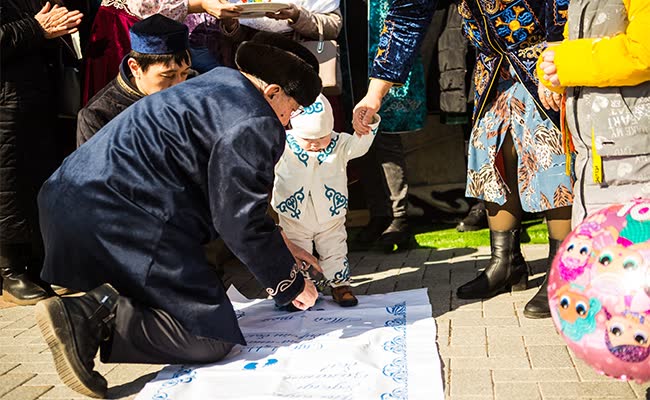Kazakh traditions
🎎Kazakh Traditions: Timeless Customs of the Steppe
🏕️1. Hospitality (Қонақжайлық – Qonaqzhailyq)
Hospitality is the heart of Kazakh tradition. Welcoming guests—whether friends or strangers—is a sacred duty. Guests are offered the best food and treated with great respect. The traditional serving of kumis (fermented mare’s milk) and besbarmak (boiled meat and noodles) is central to this custom.
👶2. Life-Cycle Ceremonies
Besik Toi
– Cradle Ceremony
Celebrated when a baby is placed into a cradle for the first time. Family and neighbors bring gifts and sing blessings.
Tusau Kesu
– First Steps Ritual
When a child begins walking, their legs are tied with soft ropes, symbolically cut by a respected elder to bless their journey through life.
Sundet Toi
– Circumcision Ceremony
A major rite of passage for boys, often celebrated with feasts, games, and family gatherings.
💍3. Wedding Traditions
Kuda Tusuu
– Matchmaking
Marriage arrangements are formalized when the groom’s family visits the bride’s family with gifts and a request for marriage.
Kalym
– Bride Price
A traditional dowry paid by the groom’s family as compensation and honor to the bride’s family.
Betashar
– Bride’s Unveiling
During the wedding, the bride is presented to the groom’s relatives while a singer recites poetic introductions, lifting her veil in a ceremonial moment.
🐎4. Horse Culture & Traditional Sports
Kokpar – A horseback game like polo using a goat carcass.
Kyz Kuu – A romantic horseback chase where a woman tries to outride a pursuing man.
Baige – Long-distance horse racing.
Togyzkumalak – An ancient strategy board game still played across the country.
🍲5. Traditional Foods & Meals
Besbarmak – The national dish; usually horse or lamb meat with noodles and onion broth.
Kazy – Spiced horse sausage.
Baursak – Fried dough balls served at nearly all celebrations.
Meals follow strict etiquette, such as serving tea and meat in a hierarchical order, starting with elders.
🕌6. Religious and Spiritual Traditions
Though Kazakhstan is predominantly Sunni Muslim, many Kazakhs also honor Tengrism, a shamanistic belief rooted in reverence for the sky (Tengri), nature, and ancestors. Some folk rituals and practices still reflect this ancient worldview.
🌿7. Nauryz – Spring Festival
Celebrated on March 21, Nauryz marks the Persian New Year and the rebirth of nature. Traditions include:
Preparing Nauryz Kozhe, a festive soup with 7 ingredients.
Visiting elders and exchanging blessings.
Participating in community games, concerts, and cultural displays.
🧵8. Yurt Life & Handicrafts
The yurt (ger) is more than a home—it symbolizes Kazakh identity. Inside, every item has cultural meaning, from embroidered wall hangings (tus kiiz) to carved chests and felt carpets (tekemet). Women traditionally pass down skills like felting, embroidery, and weaving.
Kazakh traditions are deeply rooted in the culture and history of the Kazakh people. Many of these traditions revolve around hospitality, family, and significant life events.
Here are some traditional Kazakh customs and their meanings:

Konakasy (Guest Reception): This tradition reflects Kazakh hospitality. When a guest arrives, they are warmly welcomed and provided with food, lodging, and entertainment. The level of formality depends on the circumstances of the guest's visit.
Korimdik (Gift Giving): Korimdik is the act of presenting a gift to someone to congratulate them on a significant gain or event in their life. The custom is called "korimdik" when the gain is related to a person or an animal and "baygazy" when the gain is material.
Shashu (Sweets Scattering): During celebrations, it is a tradition to shower the heroes of the occasion with sweets. It is believed that this act of sharing delights brings luck.
Bata (Blessing): Bata is a form of poetic expression given by the most respected or eldest person to express gratitude for hospitality, offer blessings to someone about to embark on a new phase in life, face a challenge, or travel.
Tusau Kesu (First Steps): This tradition celebrates a child's first attempts at walking. The child's legs are tied with a string of white and black colors, symbolizing the duality of life. The string is cut by an energetic and lively female relative, and it is then burnt.
Kyz Uzatu (Sending Off the Bride): This refers to the first wedding party organized by the bride's parents. It translates to "seeing off a daughter."
Betashar (Unveiling): At weddings, the custom involves lifting the veil from the bride's face. A mullah is often invited to perform an improvised song mentioning the groom's relatives. The bride must bow every time a name is mentioned, and after the song, the groom's mother lifts the veil.
Shildehana (Birth Celebration): Shildehana is the celebration of a child's birth, a joyous occasion in Kazakh culture.
Suinshi (Good News Gifts): This tradition involves giving a gift to someone who has brought good news, sharing the joy of positive tidings.
These customs and traditions are important in Kazakh society as they strengthen family bonds, showcase hospitality, and mark significant life events. They reflect the values and culture of the Kazakh people and are often observed during weddings, births, and various celebrations.